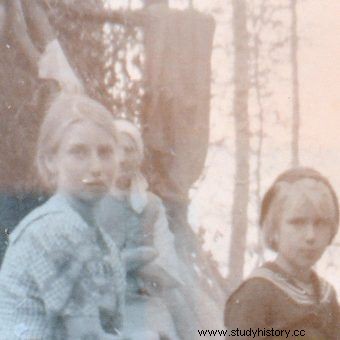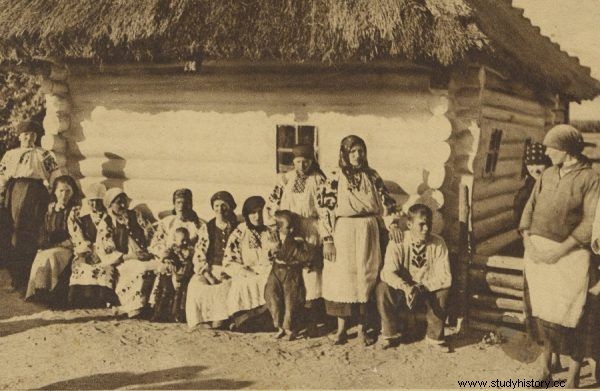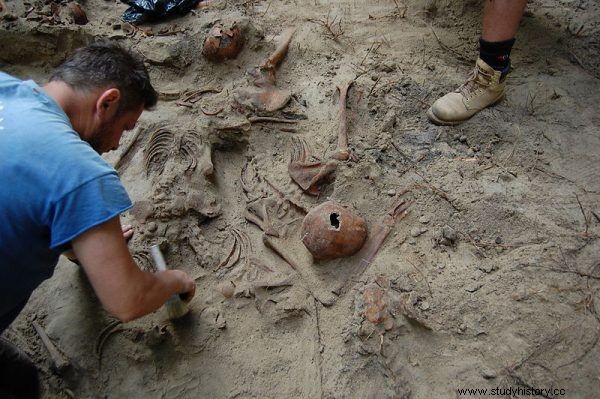There was no escape from the torturers. They mercilessly stabbed their victims with knives and pitchforks, and tore them apart with axes. The UPA made a hell on earth for the Poles in Volhynia. However, they did not manage to kill all of them. What did survivors say about the atrocities they experienced?
Even today, almost 80 years after those events, the memory of the Volhynia massacre evokes strong emotions. The trauma of the survivors - sometimes also transferred to their children and grandchildren - remains alive. In the monumental work devoted to this terrible crime, Władysław Siemaszko (who himself witnessed the Volhynia massacre) and his daughter emphasized:
The experiences related to the crimes of genocide left an imprint on the memory and psyche of the witnesses, and in some cases caused such a strong and lasting trauma, combined with the fear of vengeance by Ukrainian nationalists to this day (!) that some of the witnesses refused to report in writing and orally.

Memories of people who survived the Volhynian slaughter are terrifying. In the picture. survivors living in the Przebraże self-defense camp (the photo is a fragment of the exhibition devoted to the Volhynia massacre from Sanok).
The testimonies of those who nevertheless decided to tell about their experiences are truly awe-inspiring. It is from their individual accounts - and not from statistics or detailed calculations - that the enormity of the tragedy that befell Poles living in Volhynia during World War II emerges. How did they recall this hell on earth?
Volhynia slaughter. "This is my husband's head"
The specific images of the Volhynian ordeal differ in details - the names of the victims, the degree of cruelty of the torturers and, finally, the number of those saved from the pogrom. However, all who managed to survive that horror movie agree that in the years 1943–1945 truly Dantean scenes took place in the region.

Before 1939, the inhabitants of Volhynia did not even imagine what fate awaited them. After the torture of the Soviet and German occupation, a hell of Ukrainian slaughter awaited them. There were Dantesque scenes going on then.
In his latest book, "Wołyń betrayed", Piotr Zychowicz recalls, among other things, the account of Aleksander Pradun, who as a boy found himself in the epicenter of these tragic events. He survived because the bullet intended for him missed his head. Splashed with blood, bits of bone and pieces of brains from other victims he lay motionless and listened to the slaughter:
(...) was lying next to my mother. She hugged me tightly. Then I heard gunshots. First second Third. Each new one is getting closer ... Suddenly a bang was heard right next to me. My mother twitched convulsively, I felt a short, firm grip on her hand, then suddenly her body went limp. I felt something sticky run down my face.
Józefa Bryg, then only six years old, also witnessed the death of her mother. Years later, she said:“I realized that I was lying on the ground, crushed by my mother's body. Mom had her hands spread apart. (…) One leg was sticking out from under my mother's body. I was afraid to change position because I thought the Banderites remembered my body position. ”
The girl survived by pretending to be a dead man. However, it was not the end of her horror movie. Orphaned, she went to the home of Poles who, like her, survived the slaughter:
In their home I heard these conversations:"This is my husband's head." "And this is my sister's hand". These people pulled the remains of Poles murdered by Ukrainian nationalists from the well . The corpse was chopped into pieces and massacred. Survivors recognized the body parts of their loved ones.
In turn, Jan Bławat, who miraculously avoided death during the massacre of the Polish population, which the Ukrainians organized for our compatriots during a mass in a church near Porycko on July 11, 1943, recalled:
My father was killed in front of me, he was shot under the eye, grandfather was injured in the fourth pew in the church. I had no one to go to. Grandfather ordered to go to my aunt Helenka, who lived in Porycko. I ran to her. I couldn't enter because in the corridor a woman - had her head split in half with an ax - was lying dead , and I was afraid they might be inside. I retreated to the woodshed, only looking from the woodshed to see if someone would come to the horses or not. And fortunately my brother [showed up].
"Her mouth was tied with barbed wire"
What the UPA was doing in Volhynia exceeded all limits of cruelty. The torturers had no mercy for anyone. They killed both adults and children. Women and men. Strangers, but also their own relatives. People whose only "fault" was the fact that they were Poles. Piotr Zychowicz in "Betrayed Volhynia" reports:
A Ukrainian shot a child - one survivor recalled. - Years, maybe three or four. The bullet tore off his skull and the baby got up, and then, crying, it ran back and forth with his brain open, throbbing.

Exhumation of the remains of the victims of the Volhynia massacre.
Similar crimes were commonplace in Volhynia in those dark years. Mirosław Łoziński, who joined the partisan 4th Company commanded by Tadeusz Wojnicki "Grom" as a teenager, to defend his hometown Przebraż against subsequent UPA attacks, recalled:
Baltazar Trybulski told me that he and his brother were watching over the buildings at night (...). However, they did not notice the group of UPA who stormed the yard, and then the cottage. (...) They watched with horror as the UPA pulled his wife and two sons out of the house.
First, they smashed the heads of the boys against the walls of the houses. Later they started butchering Trybulski's wife. To keep her from screaming, her mouth was tied with barbed wire.
Usually the UPA attacked at night to surprise victims in their sleep. As Roman Domański, who in those critical days fought against the Ukrainians with his colleagues, bluntly stated:“They are terrible cowards and rabble. By murdering the defenseless, they were heroes. When they met resistance, they fled where pepper grows, waving their hands. We said back then that they were "chopping the windmill".

photo:Silar / CC BY-SA 3.0 Church choir from Ostrówka. On August 30, 1943, the UPA exterminated this village in Volhynia (the photo is a fragment of the exhibition devoted to the Volhynia massacre in Sanok).
At times, the tragedy of entire families took place during feverish attempts to escape. Henryk Kloc, whose account is quoted in "Betrayed Volhynia" by Piotr Zychowicz, became a witness and participant in such a drama. Henryk himself could have spoken of great "happiness" - he survived, pretending to be dead, despite his injuries. His neighbors, however, were not fortunate:
Maria Jesionek was lying next to me. (...) She also jumped out of the burning building. She was dead when hit by the bullet. While falling, she crushed the baby and strangled it with her weight . Her son Janek was also shot. He was lying next to her with his head shot through.
"God, let him kill, not hurt"
But it was not death that the Poles who were methodically slaughtered by Ukrainian nationalists during the pogrom feared most. Born in 1932 in Trościanka in Volhynia, Maria Berny, a former senator of the Republic of Poland, confessed years later:
We were not afraid of death then. We were afraid of the murder, the way we would die. The parents prepared themselves. Mom had a little ax; I remember, with the yellow handle. Father - a two-bullet pistol.
They planned that when the killers came, our dad would shoot us. Mom and I will get the right to a dignified death. I don't know how my father imagined his own. Not all of them had weapons and we did.
Those who were not given the grace of a quick and painless death by their own hands were left to the UPA and providence. Janina Martosińska, one of the survivors of the pogrom in the village of Ostrówki, who was attacked by a bard of the Ukrainian Insurgent Army commanded by Ivan Kymiczak "Łysy" on August 30, 1943, recalled after the war:"I prayed in my spirit:" God, let him kill and not hurt " . However, the torturer missed - the injured woman survived.
As Maria Fredro-Boniecka notes, the Volhynian slaughter for many decades after the ash fell on the burned Polish villages in Volhynia, and most of the perpetrators of these cruel crimes were long dead, arousing extremely different attitudes of the survivors:
Some people still have fear, can't get over their hatred , others are looking for rapprochement, confrontation, cold assessment, others need to forgive former torturers, and there are those who are silent and cut themselves off from those events - they do not want to remember.
July 11 is celebrated as the National Day of Remembrance for the Victims of Genocide committed by Ukrainian nationalists on the citizens of the Second Polish Republic. But is it possible to forget about the hell of the bestial genocide that Ukrainian nationalists committed against Poles at all?
